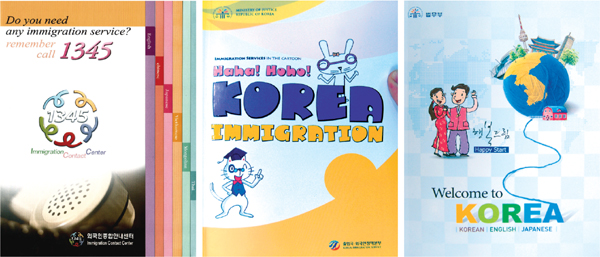
- Updated 2024.4.24 17:16
- All Articles
-
member
icon
-
facebook
cursor
-
twitter
cursor
A great number of foreign residents on Jeju Island came here as English teachers and holders of E2 visas. We all know of English-speakers who do tutoring outside of their workplace or contracts, and most of us know such “privates” contravene immigration law. But with most information given to new teachers coming from their employers, what is and isn’t allowed? Kang Phil Suk, who is in charge of visas and registration at the Jeju Immigration Office, explained.
Having first come to Korea on an E2 visa myself in 2001, I was amazed on visiting the Jeju Immigration Office on how much more user-friendly the service has become. Multiple publications are available in English and many other languages and a contact center (dial 1345 anywhere within Korea and 82-1345 outside the country) provides multilingual counseling in 18 languages. An e-government portal (www.hi korea.go.kr) also has many online immigration services in Korean, English, Chinese and Japanese.
Kang Phil Suk stressed that anyone unsure of what is and isn’t allowed under the terms of their visa (which may not necessarily match the contract terms) should contact the Immigration Office for verification. Basically though, an E2 visa requires that the visa holder work only within the boundaries of a pre-assigned workplace. Any other work, even volunteering, is not technically allowed but will be considered on a case-by-case basis.
“If any E2 visa holders want to do extra work, contact immigration office first, by phone or visit,” he said.
When asked if an E2 holder would be covered by their visa while accompanying a class on a field trip, for instance to a museum, Kang said he had not heard of such a case but his feeling would be that it contravened the law.
“The safest way is to get the hagwon owner to call [immigration] and ask.”
After reviewing and discussing the question in depth with other officials, an official said that, in principle, E2 holders even in the public school system are not allowed to go on field trips or educational outings as it would be outside their pre-assigned workplace. However, she said, with the permission of school principals or the Jeju Office of Education, the interpretation of workplace could be more flexibly made. Again, it was advised that the Immigration be contacted for individual counseling to see if an exception could be made.
If one’s work address changes because of a move to different premises, it should be changed on the visa as part of registering the new premises for business.
| |
 |
|
| ▲ Korea Immigration Service provides publications, online and telephone help in 18 languages. Images courtesy Korea Immigration Service |
The most common immigration violation by E2 visa holders, Kang said, was teaching private lessons, followed by doing additional work at a second institute not covered on the visa.
If such illegal activities are discovered, the investigation section will take several factors into account.
“Mainly if it was intentional, and how serious and how long” the offending had taken place. The most serious case, he said, was when a visitor to Korea on a tourist visa taught at an institute without a covering visa.
For the offending foreigner, “the most serious penalty is deportation.” (“Any Korean citizen who arranges the employment of foreigners illegally or hires illegal immigrants” is also an immigration offender, according to a Korea Immigration Service publication.) An offender may be held at a detention center during the initial investigation and inspection stages “if there is considerable evidence that the foreigner must be deported and if the person might flee.”
Asked if such offences could ever result in criminal charges, which could affect their legal standing elsewhere, Kang said such things were not part of immigration law but applied to crimes such as drug possession.
If deported, a person cannot return to Korea for five years, Kang said. If they do so without declaring the earlier offence on documents when entering the country, it becomes a more serious issue of fraud and would be dealt with by law.
Interestingly, and contrary to what I have read elsewhere, Kang said that when an E2 holder completes a contract and has arranged a subsequent contract with another employer within Korea, “In principle, they have to leave the country, but there are exceptions.”
“There are no clear-cut rules but it is considered on a case-by-case basis,” he said.
Addressing a concern many English teachers have about having to resubmit their degree certificate and academic transcripts when they take a new job or return to the country, Kang said it did not apply only to E2 holders.
“In the long-term, it needs to be modified or changed to improve the efficiency but for now, there is no other way,” he said.
But the service has definitely improved immensely in the 10 years this writer has been visiting Korea, and I believe, based on this, that it will continue to do so.
|
|
|
|
|
|
|
|
ⓒ Jeju Weekly 2009 (http://www.jejuweekly.net)
All materials on this site are protected under the Korean Copyright Law and may not be reproduced, distributed, transmitted, displayed, published without the prior consent of Jeju Weekly. |
|
|
|
|
| Jeju-Asia's No.1 for Cruise |
|
|
|
Title:The jeju Weekly(제주위클리) | Mail to editor@jejuweekly.net | Phone: +82-64-724-7776 Fax: +82-64-724-7796
#503, 36-1, Seogwang-ro, Jeju-si, Jeju-do, Korea, 63148
Registration Number: Jeju, Ah01158(제주,아01158) | Date of Registration: November 10,2022 | Publisher&Editor : Hee Tak Ko | Youth policy: Hee Tak Ko
Copyright ⓒ 2009 All materials on this site are protected under the Korean Copyright Law and may not be reproduced, distributed, transmitted, displayed, published
without the prior consent of jeju weekly.com.

|





















